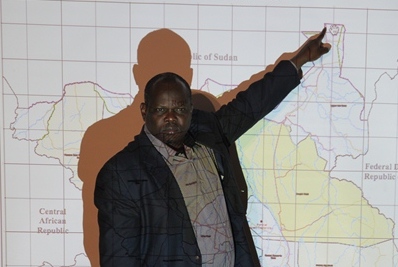Arbitration most “civilized” way to resolve Sudanese border dispute – Pagan
June 13, 2012 (JUBA) — South Sudan’s proposal to have the disputed
borders with Sudan settled through the arbitration remains the most
“civilized” way to resolve the outstanding issue, Pagan Amum, South
Sudan’s chief negotiator told journalists on Wednesday.

country out of its borders. South Sudan has documents and is ready to
present them before the court of arbitration,” he said.
Pagan also displayed Southern Sudan’s map of November 1955, issued by
the Khartoum-based Sudan Survey Department, comparing it with the
current map of South Sudan. The new map also showed some marked
territories, which he said, Sudan annexed from South Sudan hence
resulting into the current border dispute.
“In this map, you can clearly see that Abyei is part of South Sudan,”
he said while pointing to the 1955 border map.
“This is a clear indication that the Republic of Sudan is annexing
South Sudan territories and as attempting to forcefully grab our
land,” he added.
President Salva Kiir, on Monday told members of the country’s national
assembly that South Sudan has written to the African Union Peace and
Security Council (AUPSC) to have the border issue referred to the over
the Permanent Court of Arbitration (PCA), should talks on the matter
failed in Addis Ababa, Ethiopia.
The South Sudan leader also accused Khartoum of “playing games”
instead of resolving the border issue with South Sudan through
dialogue as mandated by the 2005 Comprehensive Peace Agreement (CPA).
However, South Sudan’s chief negotiator said his country remains in
full compliance with the AUPSC roadmap and the United Nations Security
Council (UNSC) resolution 2046.
The resolution, among others, called for the complete withdrawal of
both Sudan and South Sudanese troops from the disputed oil-producing
Abyei region.
According to Amum, however, while South Sudan complied and withdrew
its forces 10km away from the 1956 border, Sudan reportedly disagreed,
which culminated into last week’s deadlock on the ongoing talks
facilitated by the AU High Level Implementation Panel (AUHIP).
He outlined a series of undertaken by South Sudan, including writing
to both the UNSC and AUPSC unconditionally accepting to resume
negotiations with Sudan, agreeing to cease hostilities, full
withdrawal of their forces from the disputed areas of Heglig and Abyei
and formally employing, through presidential decrees, members of the
joint demarcation committee and joint border commission as required.
“RSS [Republic of South Sudan] has committed to walk the path of
peace,” Amum said, adding that, “War is our past.”
The senior SPLM official also accused the Sudan government of failure
to comply with the UNSC resolution 2046 as well as AUPSC, alleging
continued aerie bombardments of South Sudan territories, not formally
declaring cessation of hostilities, rejecting unconditional
negotiations and instead insisting that security be discussed first
before key issues like borders, oil, nationality and Abyei.
“The Republic of South Sudan expects the African Union and the UN to
utilize all necessary measures to now require Sudan to comply fully
(including through the imposition of sanctions),” said Pagan.
Both parties, he confirmed, are due to return to Addis Ababa for the
next round of negotiations, after last week’s deadlock, and further
reiterated South Sudan’s readiness to talk and provide the public with
information on progress, if any, resulting from the post-independence
discussions.
“The RSS remains hopeful that Khartoum also shares a mutual desire to
reach a peaceful resolution within the next three months of all
security and other outstanding matters addressed by the UN and AUPSC,”
he said.
(ST)
